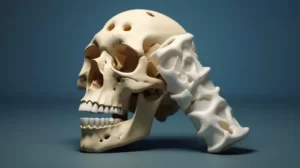Trying to lose or gain weight comes with a set of challenges, but did you know that certain changes in your weight can actually increase your chance of developing bone fractures? Research shows that weight fluctuations can have significant effects on your bone health, specifically for postmenopausal women.
In a study conducted on over 120,000 postmenopausal women between the ages of 50-79, the Women’s Health Initiative Observational Study and Clinical Trials explored the relationship between weight change and bone fracture risk. The results revealed a substantial increase in the chances of fractures, both in women who lost weight and those who gained.
Understanding the Connection Between Weight and Fractures
The connection between body weight and bone fractures is not a simple one. If you weigh too little, you run the risk of developing fractures due to having a weak skeleton. On the other hand, obesity can also increase your chances of experiencing a fracture.
The 11-year study found that women who lost over 5% of their body weight faced a 65% increase in the likelihood of hip fractures. Additionally, they had a 9% increase in the chances of suffering an arm fracture, as well as a 30% increase in spinal or pelvis fractures.
As for women who gained weight, the study observed a 10% increased chance of arm fractures and an 18% higher risk of leg fractures.
Preventing Bone Loss When Weight Fluctuates
According to Juliet Compston, a professor of bone medicine at Cambridge University, it’s essential to take measures to prevent bone loss when your weight changes. Techniques to maintain your bone health include weight-bearing exercises and a diet rich in leafy green vegetables, which contain the necessary nutrients to support your skeleton.
To get a better understanding of how weight-bearing exercises can strengthen your bones, it’s essential to know the difference between weight-bearing and non-weight-bearing exercises.
Weight-Bearing Exercises for Stronger Bones
Weight-bearing exercises force your body to work against gravity while standing. These activities help build stronger, denser bones and may reduce the risk of fractures. Some examples of weight-bearing exercises are:
- Brisk walking
- Jumping rope
- Dancing
- Tennis
- Hiking
- Stair climbing
Keep in mind that bodyweight exercises, such as squats and push-ups, can also be considered weight-bearing because they force your muscles and bones to work harder against gravity.
Non-Weight-Bearing Exercises
On the other hand, non-weight-bearing exercises are activities where your body is supported, with no added force against gravity. These exercises may be beneficial for overall fitness, but they do not offer the same bone-strengthening benefits as weight-bearing exercises. Some examples are:
- Swimming
- Yoga
- Pilates
- Cycling
- Rowing
A Healthy Diet for Bone Health
In addition to incorporating weight-bearing exercises into your fitness routine, consuming a nutrient-dense diet that includes plenty of leafy green vegetables can support bone health. Leafy greens such as spinach, kale, Swiss chard, and collard greens are high in calcium, magnesium, and potassium, which contribute to bone mineral density.
Moreover, vitamin K, abundant in leafy green vegetables, plays a crucial role in bone formation and is needed for the proper function of osteocalcin – a protein responsible for bone mineralization.
Try incorporating leafy greens into your daily meals; whether it’s adding spinach in your omelet, a kale salad for lunch, or mixed greens with your dinner, these little dietary additions can go a long way in supporting bone health.
The Bottom Line on Weight Change and Bone Health
As we age, keeping our bones healthy should be a priority. If your weight changes, be aware that you need to take additional steps to protect your skeleton. Incorporate weight-bearing exercises into your fitness routine, consume a balanced diet rich in leafy green vegetables, and talk with your healthcare provider to discuss any concerns regarding your bone health. By taking these proactive measures, you can help reduce the risk of fractures and maintain your overall well-being.



